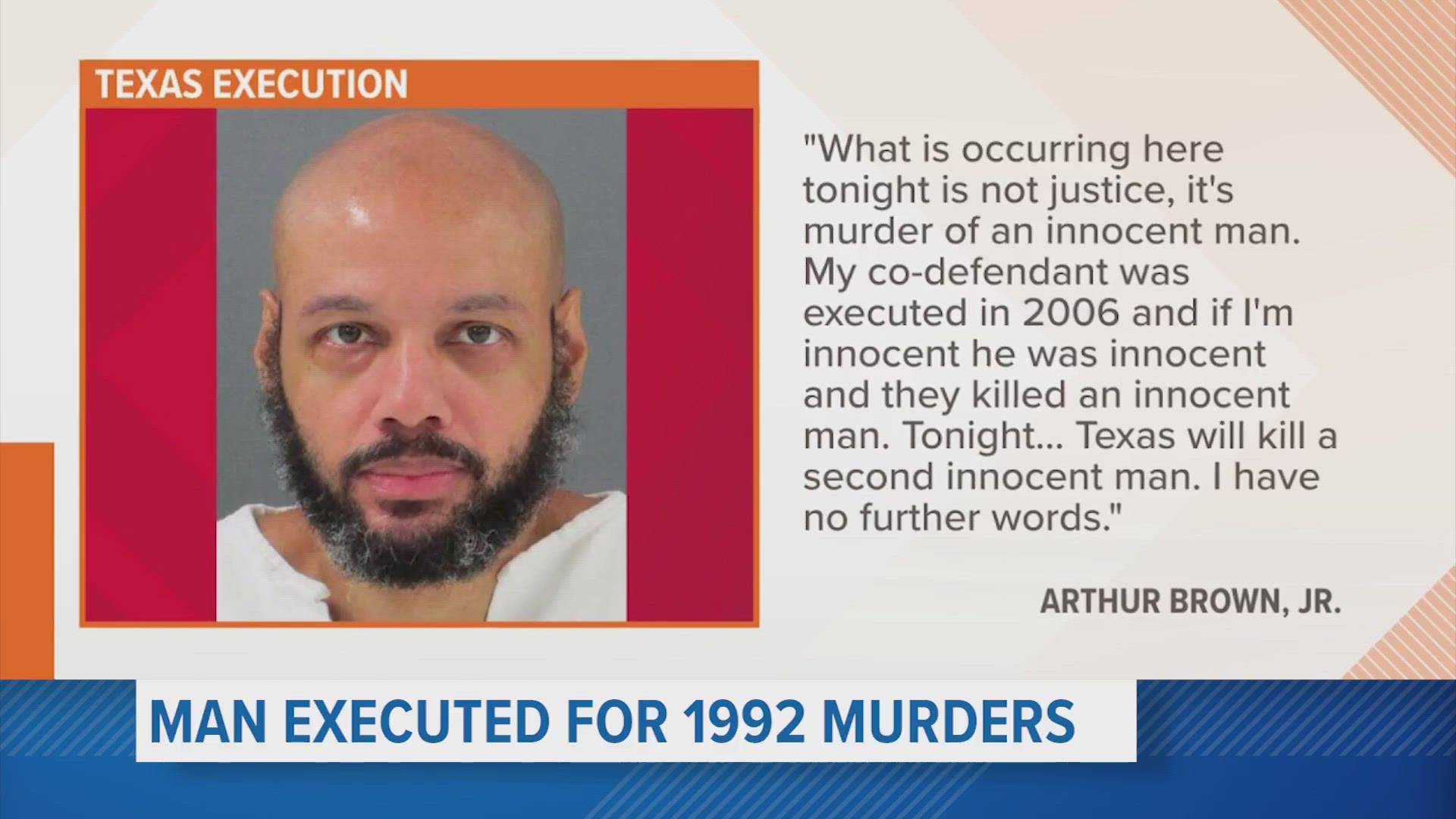HUNTSVILLE, Texas — Texas has executed an inmate convicted of the drug-related killings of four people more than 30 years ago, including a woman who was 9 months pregnant.
Arthur Brown Jr., 52, insisted he was innocent before receiving a lethal injection Thursday evening at the state penitentiary in Huntsville. He was condemned for the June 1992 slayings, which took place in a Houston home during a drug robbery.
Authorities said Brown was part of a ring that shuttled drugs from Texas to Alabama and had bought drugs from Jose Tovar and his wife Rachel Tovar.
Killed during the drug robbery were 32-year-old Jose Tovar; his wife’s 17-year-old son, Frank Farias; 19-year-old Jessica Quiñones, the pregnant girlfriend of another son of Rachel Tovar; and 21-year-old neighbor Audrey Brown. All four had been tied up and shot in the head. Rachel Tovar and another person were also shot but survived.
“I don’t see how anybody could have just killed a pregnant woman and then made her suffer so much. It’s just beyond words,” Quiñones’ older sister, Maricella Quiñones, said before the execution.
Brown was the fifth inmate put to death in Texas this year and the ninth in the U.S. His execution was the second of two in Texas this week. Another inmate, Gary Green, was executed Tuesday for killing his estranged wife and her young daughter.
Brown was defiant in his final statement.
“What is happening here tonight isn’t justice,” he said. “It’s the murder of another innocent man.”
He said he’d proved his innocence “but the courts blocked me.”
“The state hid the evidence so long and good that my own attorneys couldn’t find it,” he said in a loud voice, looking at the ceiling of the death chamber while strapped to a gurney and not making any eye contact with a half-dozen relatives of his victims who watched through a window a few feet from him.
As the lethal dose of the sedative pentobarbital took effect, he took two deep breaths, gasped and then began snoring. After six snores all movement stopped. He was pronounced dead 17 minutes later, at 6:37 p.m.
Harris County District Attorney Kim Ogg, who was among the execution witnesses, disputed Brown’s claims of innocence.
“He has been the beneficiary of a judicial system that bent over backward at the local, state and federal levels, all the way to the United States Supreme Court, who have all affirmed his conviction and sentence,” she said.
Three members of Jessica Quinones’ family, including her mother, also were among the witnesses and released a statement saying the day was neither one of joy nor celebration but “profound relief and gratitude.”
“After 30 years of anguish and uncertainty, we are finally able to rest knowing the monster who destroyed so many lives will never again torment the body or soul of another,” they said.
The U.S. Supreme Court earlier Thursday declined an appeal from Brown’s attorneys to halt the execution. They had argued that Brown was exempt from execution because he was intellectually disabled, a claim disputed by prosecutors. The high court has prohibited the death penalty for the intellectually disabled.
“Mr. Brown’s intellectual limitations were known to his friends and family. ... Individuals that knew Mr. Brown over the course of his life have described him consistently as ‘slow,’” his attorneys wrote in their petition to the Supreme Court.
One of Brown’s accomplices in the shootings, Marion Dudley, was executed in 2006. A third partner was sentenced to life in prison.
Brown, who was from Tuscaloosa, Alabama, had long maintained another person committed the killings.
Brown’s attorneys had previously filed other appeals that had been rejected by lower courts. They argued he was innocent and that a witness actually implicated another suspect. They also claimed Brown’s conviction was tainted by racial bias, alleging one of the jurors decided he was guilty because he was Black.
A judge in Houston on Tuesday denied a request by Brown’s attorneys for DNA testing of evidence that they said could have exonerated their client.
Josh Reiss, chief of the Post-Conviction Writs Division with the Harris County District Attorney’s Office in Houston, called Brown’s last-minute appeals a delay tactic.
Reiss said school records submitted at Brown’s trial showed while the inmate was initially thought to possibly be intellectually disabled in the third grade, by ninth grade that was no longer the case. The prosecutor also said Brown’s claims of innocence were problematic as the other suspect alleged to be the killer was found by investigators to not have been in Houston at the time.
“It was an absolutely brutal mass murder,” Reiss said, adding: “These families deserve justice.”
Maricella Quiñones said her sister was an innocent victim who wasn’t aware the Tovars were dealing drugs from the home. She said her mother also blames the Tovars for what happened.
“My mother’s not the same since my sister passed away,” she said.
She described her sister as a “very loving, caring person” who had looked forward to being a mother.
She said her family would likely never get closure.
“We lost two persons. Alyssa never got a chance at life,” she said, referring to her sister’s unborn child.
Brown was one of six Texas death row inmates participating in a lawsuit seeking to stop the state’s prison system from using what they allege are expired and unsafe execution drugs. Despite a civil court judge in Austin preliminarily agreeing with the claims, five of the inmates have been executed this year.

